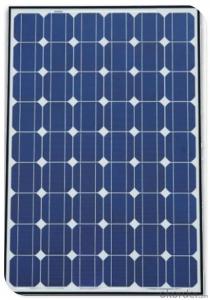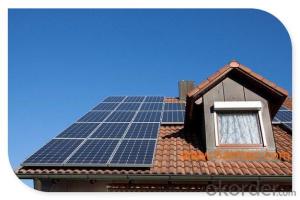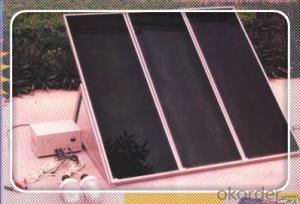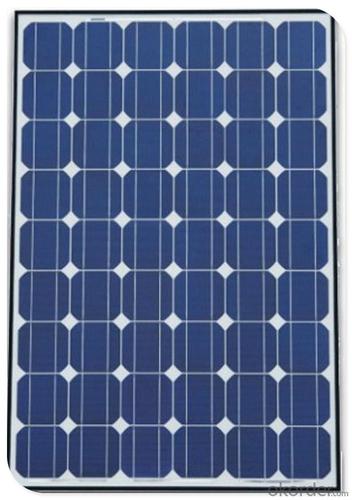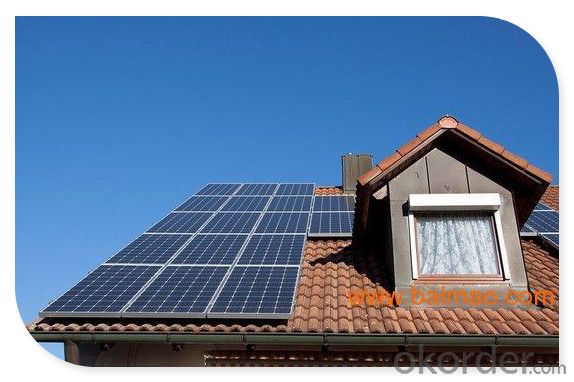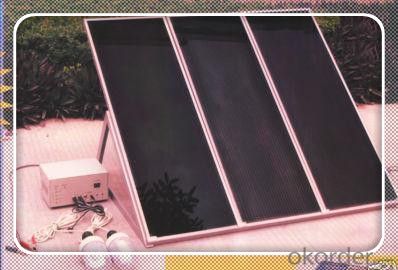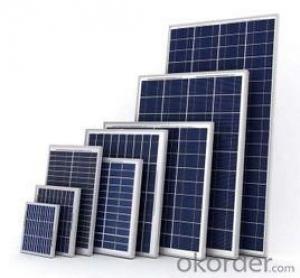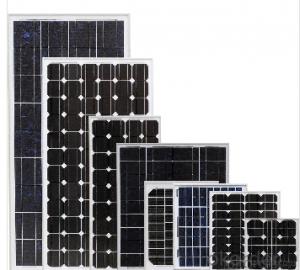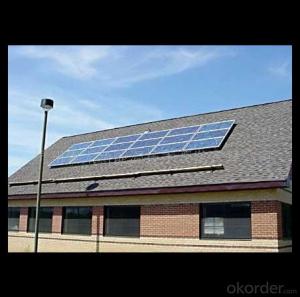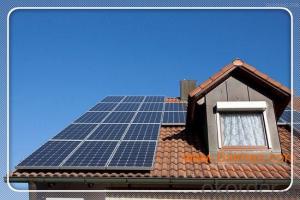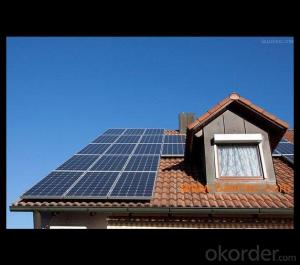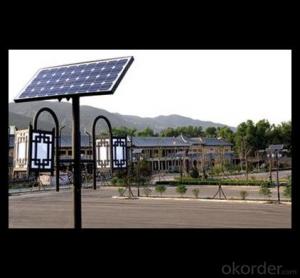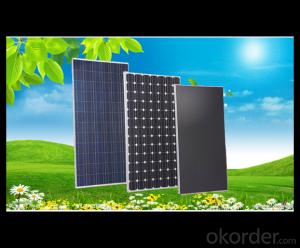Solar Panels in Texas:265w Direct Factory Sale Price 260-300watt Solar Panels
- Loading Port:
- China main port
- Payment Terms:
- TT OR LC
- Min Order Qty:
- 10000 watt
- Supply Capability:
- 100000 watt/month
OKorder Service Pledge
OKorder Financial Service
You Might Also Like
Specification
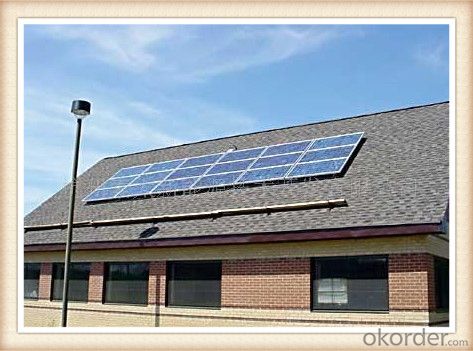
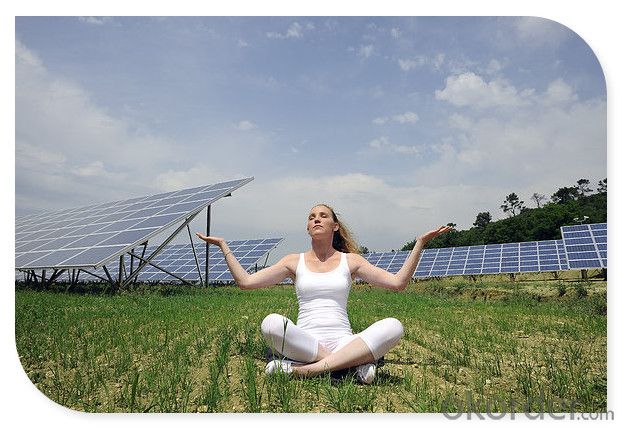
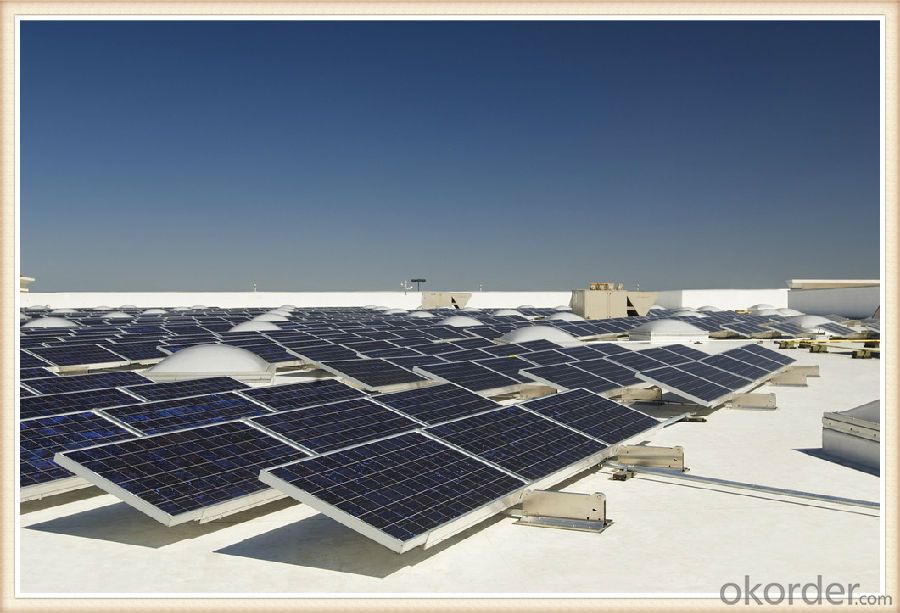
Solar Module Introduction
Solar modules use light energy (photons) from the sun to generate electricity through the photovoltaic effect. The majority of modules use wafer-based crystalline silicon cells or thin-film cells based on cadmium telluride or silicon. The structural (load carrying) member of a module can either be the top layer or the back layer. Cells must also be protected from mechanical damage and moisture. Most solar modules are rigid, but semi-flexible ones are available, based on thin-film cells. These early solar modules were first used in space in 1958.
Electrical connections are made in series to achieve a desired output voltage and/or in parallel to provide a desired current capability. The conducting wires that take the current off the modules may contain silver, copper or other non-magnetic conductive transition metals. The cells must be connected electrically to one another and to the rest of the system. Externally, popular terrestrial usage photovoltaic modules use MC3 (older) or MC4 connectors to facilitate easy weatherproof connections to the rest of the system.
Specification
Model Type | |
Peak Power-Pmax(W) | 5-200W |
Open Circuit Voltage-Voc(V) | 44.2 |
Maximum Power Voltage-Vmp(V) | 36 |
Short Circuit Current-Isc(A) | 5.4 |
Maximum Power Current-Imp(A) | 5 |
Maximum System Voltage | 1000V DC |
Maximum Series Fuse Rating | 10A |
Power Tolerance | -1~+3% |
Temperature Coefficients of Pmax | -0.45%/℃ |
Temperature Coefficients of Voc | -0.348%/℃ |
Temperature Coefficients of Isc | 0.031%/℃ |
Nominal Operating Cell Temperature | 44.5±2℃ |
Standard Testing Condition(STC) | Irradiance:1000W/m²;Temperature:25℃;AM=1.5 |
Qualification Test Parameters | |
Operating Temperature | -40℃~+85℃ |
Storage Temperature | -40℃~+85℃ |
Pressure Bearing | ≥5400Pascal/m² |
Wind Bearing | ≥5400Pascal/m² |
Mechanical Characteristics | |
Cell Size | Mono 125*125mm±0.5 |
No.of Cells | 72pcs(6*12) |
Dimension | 1580*808*40mm |
Weight | 15.5Kg |
Glass | 3.2mm High Transmission,Low Iron |
Frame | Anodized Aluminum Alloy |
Junction Box | IP65Rated |
Internal Diodes | 3 Bypass Diodes |
Cable | 1*4.0mm² Length 900mm |
Images
Packing & Shipping:
We have rich experience on how to pack the panels to make sure the safety on shipment when it arrives at the destination.
The normal size is packed by 25pcs/ carton / pallet. Paper carton for FCL shipping and wood carton for LCL shipping.
Features
1.High reliability with guaranteed -3% to +5% power output tolerance, ensuring return on investment
2.High conversion efficiency based on leading innovative photovoltaic technologies
3.Withstands high wind-pressure and snow load, and extreme temperature variations
4.Attractive appearanceUnique frame design, high mechanical strength, and easy Installation
Warranty:
For c-Si panel: 25years output warranty for no less than 80% of performance, 10 years output warranty for no less than 90% of performance. Free from material and workmanship defects within 5 years.
For a-Si panel: 20 years output warranty for no less than 80% of performance, 10 years output warranty for no less than 90% of performance. Free from material and workmanship defects within 2 years.
•100% product quality protection
•100% on-time shipment protection
•100% payment protection for your covered amount
FAQ:
(1)What price for each watt?
It depends on the quantity, delivery date and payment terms.
(2)What is your size for each module? Can you tell me the Parameter of your module?
We have different series of panels in different output, both c-Si and a-Si. Please take the specification sheet for your reference.
(3)Can you provide the peripheral products of the solar panels, such as the battery, controller, and inverter? If so, can you tell me how do they match each other?
Actually we are only manufacturer of solar panels, but we could try to source them for you in China if you need. We could provide you an optimal system design to instruct you how to install.
(4)Do you have the CE, TUV, UL Certification?
We’ve already passed all the tests, and any certificate is available.
(5)Have you ever sold your products to companies in my country?
Of course, we have customers in all general PV markets, but I think we should expand our market share along with the market growth.
(6)When did your company set up? You are a new company, how can I believe your quality?
We entered into Solar PV industry in 2005, now we have several plants in manufacturing of a-Si and c-Si panels, and our capacity is 220MW per year. Till now we have already passed all the tests by authorized laboratories, e.g. TUV, VDE, UL.
(7)Can you help us install the module if we cooperate with you?
We haven’t entered into installation sector, but we have the plan in near future.
(8) How do you pack your products?
We have rich experience on how to pack the panels to make sure the safety on shipment when it arrives at the destination.
(9) Can you do OEM for us?
Yes, we can.
(10)Can we visit your factory?
Surely, I will arrange the trip basing on your business schedule.
- Q: What is the average cost of solar panel installation?
- The average cost of solar panel installation can vary depending on several factors such as the size and type of the system, location, and any additional equipment or services required. However, as of 2021, the average cost for a residential solar panel installation in the United States ranges from $10,000 to $30,000, including equipment, labor, and permitting costs. It is always recommended to obtain multiple quotes from reputable solar installation companies to get a more accurate estimate based on your specific needs and circumstances.
- Q: The average solar panel produces 0% of the energy that is put into it. What is happening to the other 90%? Is it being reflected or is it being obsorbed by materials that are not a part of the solar cell? Is it possible to one day have near 00% efficient solar cell technology?
- Sunlight comes in many frequencies, that's why it's white. Solar Photovoltaics require a photon to displace an electron from a semiconductor and that only happens at one frequency depending on what the semiconductor material is, therefore only one exact frequency gets turned into power. They are working on using organic dyes or quantum dots to absorb the energy in different frequencies and re-emit the energy in the desired frequency. They also are working on using multiple semiconductor materials to try and capture more frequencies. The rest of the energy becomes heat which also reduces the efficiency of the solar cells. The lab record for solar photovoltaics is 42.8% efficiency and quantum dots promises to be 65% to 75% efficient. Keep in mind that fossil fuels are based on energy collected by photosynthesis over millions of years. The efficiency of photosynthesis with modern plants is about 0.5% and the theoretical maximum efficiency of photosynthesis is 6.6%. All of our current energy use is based upon a small fraction of 0.5% efficiency over millions of years.
- Q: I contend:As far as the solar panels causing global warming I'll try to explain. If you put a black panel on the ground or on your house and don't connect it to anything, it will absorb solar energy (heat) during daylight and release it at night (radiation). The net heat gain is zero. If you hook up a solar panel in the same place but hook it up to batteries, charge the batteries during sunlight hours and using that energy to electrically heat the home at night. The panels will absorb solar energy during the day but will convert that to electrical energy in the batteries instead of radiating it back into space at night. The result is a net gain in earth's temperature.Right or wrong?
- As far as it goes, you're right: putting up a big black object increases the total amount of energy absorbed from the sun. But that's only part of the story. If you didn't put up the solar panel, the same radiation would hit the earth. The earth already absorbs 2/3 or so of the energy that comes in (albedo .30), so adding even a perfectly black object increases it only by 50%. But it's not even that much, because most of the extra energy absorbed is converted into electricity. Solar panels are about 0-5% efficient, so half of the extra energy is turned into electricity rather than heat. Eventually it's put to use and turned into heat, but that heat was going to come from somewhere else anyway. (Even if it's just powering your DVD player, it turns into heat just the same as if you were using it to heat your house.) If you dig up a gallon of petroleum or fission a microgram of uranium, that's heat introduced into the earth's atmosphere. And these processes are inefficient: between generation and transmission you lose about 75% of the energy, meaning you've introduced 4 times as much energy into the atmosphere as you've actually used. So with a solar panel, you add extra heat to the earth by about 25% of incoming solar radiation, but you've offset external costs by about 45% of incoming solar radiation. The net effect is to cool the earth. And that assumes that the solar panel itself is perfectly black, which isn't the case. Real commercial solar panels have an albedo of about .35, which makes them more reflective than dirt and considerably more reflective than asphalt shingles, which have .03 albedo. In other words, even if you didn't actually use the solar panels for electricity, they'd be cooling the earth just by reflecting energy back into space more than your regular shingles.
- Q: Can solar panels be used for powering electric fences?
- Yes, solar panels can be used to power electric fences. Solar panels can generate electricity that can be stored in batteries and used to power electric fence systems, providing a reliable and eco-friendly source of energy for the fences.
- Q: What controllers and all that stuff do I need for these solar panels. Oh and the the batteries will be rigged up to a big electric motor so please leave information on how to wire the batteries to the motor...THANKS!!! 0 POINTS!
- See answers to your previous questions!!
- Q: Can solar panels be used in areas with high levels of vandalism?
- Solar panels can be used in areas with high levels of vandalism, but additional precautions may need to be taken to protect them from potential damage.
- Q: Do I just run the wire from the panel into the charge controller and then to the battery AND can I simultaneously draw energy from the battery while it is being charged by the panel?Is it as simple as hooking it up like that?
- The solar panel wires go to the charge controller. The charge controller wires go to the battery. You can also run wires from battery to a load ONLY IF it is DC load. If any AC loads, then you need a inverter to change dc to ac.
- Q: Can solar panels be used for charging electric scooters?
- Yes, solar panels can be used for charging electric scooters. By connecting the solar panels to an appropriate charge controller and then to the scooter's battery, solar energy can be harnessed and stored to power the scooter, providing a clean and renewable source of energy. However, the efficiency of solar panels may vary depending on various factors such as the size of the panel, sunlight availability, and the scooter's power requirements.
- Q: Can solar panels be used on vehicles?
- Yes, solar panels can be used on vehicles. They can be installed on the roof or the body of the vehicle to harness sunlight and convert it into electrical energy, which can be used to power various systems or charge the vehicle's battery. This technology is commonly used in electric and hybrid vehicles to improve their energy efficiency and reduce their carbon footprint.
- Q: Can anyone give me some info on how to figure how many panels needed for a 0 volt 2 amp pool motor. Thanks/ Run 5 hours a day
- You okorder /
Send your message to us
Solar Panels in Texas:265w Direct Factory Sale Price 260-300watt Solar Panels
- Loading Port:
- China main port
- Payment Terms:
- TT OR LC
- Min Order Qty:
- 10000 watt
- Supply Capability:
- 100000 watt/month
OKorder Service Pledge
OKorder Financial Service
Similar products
Hot products
Hot Searches
Related keywords
